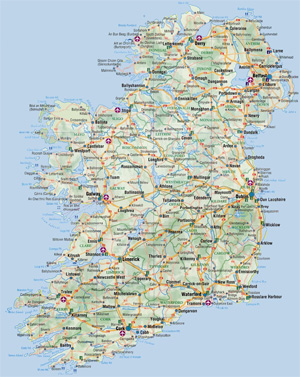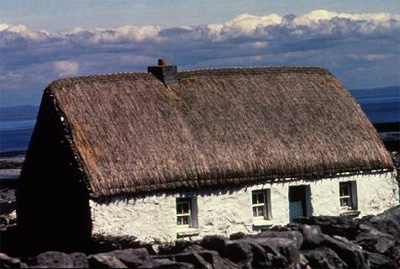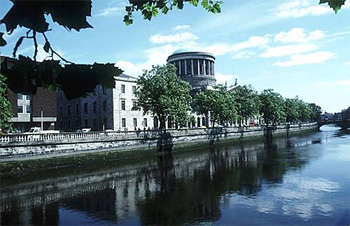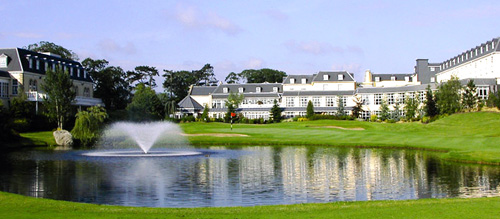IRELAND (Irish Éire), lies in northwestern Europe occupying most of the island of Ireland, the second largest of the British Isles. The Republic of Ireland lies to the west of Great Britain, the largest island in the archipelago. It is separated from Great Britain to the east by the North Channel and the Irish Sea, and to the southeast by Saint George’s Channel. The western and southern shores of Ireland meet the North Atlantic Ocean. Ireland’s only land border is with Northern Ireland, a province of the United Kingdom of Great Britain and Northern Ireland, to the northeast. Ireland has an area of 70,273 sq km and a population of about 4.6 million. The capital and largest city is Dublin, on the island's east coast.
Ireland’s vivid green landscapes have earned it the title Emerald Isle. Traditionally, most Irish people made their living farming the land. Since the 1950s, energetic industrialization policies have promoted manufacturing, which, along with services, now dominates Ireland’s economy. In 1973 Ireland was admitted into the European Community (EC), and it is now a member of the European Union (EU) and the Eurozone. Since the 1960s Ireland has undergone a period of vigorous economic growth and rapid social change. Between the 12th and 17th centuries, England gradually extended its control over Ireland. Ireland became an integral part of the United Kingdom by the Act of Union of 1800. In the 1840s the Irish potato crop, a staple food, was destroyed by disease, leading to a great famine that killed nearly 1 million people and forced many others to leave their homeland. During the late 19th century a movement for Irish independence gathered momentum, and after a bitter war the United Kingdom agreed to partition the island. In 1921 the northeastern portion of Ireland became Northern Ireland, a province of the United Kingdom. The remainder of Ireland became self-governing in 1922 with the establishment of the Irish Free State, a dominion within the British Commonwealth of Nations. In 1937 the Free State’s name changed to Éire (a Gaelic word for Ireland) after the adoption of a new constitution by popular vote. In 1949, following passage of the Republic of Ireland Act, Ireland severed its links to the British Commonwealth and declared itself a republic. Today, the country is commonly referred to as the Republic of Ireland to set it apart from Northern Ireland. Ireland has sought to promote the eventual reunification of the island of Ireland. DUBLIN (Gaelic Baile Átha Cliath, 'Town of the Ford of the Hurdles'), capital, county borough, and seaport of Ireland, county town of county Dublin, in Leinster Province. It is at the mouth of the Liffey River, on Dublin Bay, an inlet of the Irish Sea. The city is linked by ship services with Cork, Ireland; Belfast, Northern Ireland; and various ports in England, Scotland, and France. It is also served by railroads that provide connections with important points in Ireland.
Originally founded as a Viking settlement, it evolved into the Kingdom of Dublin and became the island's principal city following the Norman invasion in 1169. The city expanded rapidly from the 17th century, and was briefly the second largest city within the British Empire and the fifth largest in Europe. Although Dublin entered a period of stagnation following the Act of Union of 1800, it remained the economic centre for most of the island. Following the partition of Ireland in 1922, the new parliament, the Oireachtas, was located in Leinster House. Dublin became the capital of the Irish Free State, and later the Republic of Ireland. Dublin (pop. 500,000; about 1.1 million in Greater Dublin) is considered as a global city and placed among the top 30 cities in the world. It is a historical and contemporary cultural centre, as well as a modern centre of education, the arts, administration, economy, and industry. Dublin has many landmarks and monuments dating back hundreds of years. One of the oldest is Dublin Castle, which was first founded as a major defensive work on the orders of King John of England in 1204. One of Dublin's newest monuments is the Spire of Dublin, or officially titled Monument of Light. It is a 121.2 metres conical spire made of stainless steel and is located on O'Connell Street. It replaces Nelson's Pillar and is intended to mark Dublin's place in the 21st century. Many people visit Trinity College to see the Book of Kells (an illustrated manuscript created by Irish monks circa 800 AD) in the library there. The Ha'penny Bridge; an old iron footbridge over the River Liffey is one of the most photographed sights in Dublin and is considered to be one of Dublin's most iconic landmarks. Dublin has a world famous literary history, having produced many prominent literary figures, including Nobel laureates William Butler Yeats, George Bernard Shaw and Samuel Beckett. Other influential writers and playwrights include Oscar Wilde, Jonathan Swift and the creator of Dracula, Bram Stoker. It is arguably most famous as the location of the greatest works of James Joyce, including Ulysses, which is set in Dublin and full of topical detail. Ireland's biggest libraries and literary museums are found in Dublin, including the National Print Museum of Ireland and the National Library of Ireland. In July 2010, Dublin was named as a UNESCO City of Literature, joining Edinburgh, Melbourne and Iowa City with the permanent title.
Dublin has more green spaces per square kilometre than any other European capital city, with 97% of city residents living within 300 metres of a park area. Dublin has a vibrant nightlife and is reputedly one of Europe's most youthful cities, with an estimate of 50% of citizens being younger than 25. There are many pubs across the city centre, with the area around St. Stephen's Green and Grafton Street, especially Harcourt Street, Camden Street, Wexford Street and Leeson Street, having the most popular nightclubs and pubs. The best known area for nightlife is Temple Bar, south of the River Liffey. The area has become popular among tourists and was developed as Dublin's cultural quarter, retaining this spirit as a centre for small arts productions, photographic and artists' studios, and in the form of street performers and small music venues. Dublin experiences a maritime climate with mild winters, cool summers, and a lack of temperature extremes. The average maximum January temperature is 8.3 °C, while the average maximum July temperature is 19.6 °C (in June, 18°C). On average, the sunniest months are May and June, while the wettest month is December, and the driest month is July. The 51st European Team Championships will be hosted at the Citywest Hotel and Conference Centre, in Saggart, a south Dublin suburb some 20 minutes from the city centre and Dublin International Airport..
Situated on 155 hectares of majestic parkland, Citywest Hotel, Conference, Leisure and Golf Resort is a truly unique property. Combining the old world charm of a country house hotel, with state-of-the-art conference and event facilities, Citywest Hotel is a world class conference and leisure destination and one of the finest hotels in Dublin. With the recent opening of the Citywest International Events and Convention Centre, with a capacity for over 4,100 guests, Citywest Hotel now offers over 110,000 square meters of flexible and versatile conference and event space. From small corporate meetings to international conferences, the 34 flexible Dublin meeting rooms and 774 room hotel accommodation Dublin are perfect for meetings, events, conferences and exhibitions from 2 to 6,000 delegates. There are a range of different Dublin Citywest dining experiences available in the Citywest Hotel from Asian cuisine and Mediterranean flair to traditional Irish dishes. Located in the resort, the Christy O'Connor Jr designed Championship Golf course offers challenging fairways for both the amateur and avid golfer alike. Guests can also enjoy complimentary parking, free Wi-Fi access, complimentary access to the newly refurbished Leisure Centre with its fully equipped gymnasium, 20m pool, and treatment rooms.
• Transfers There will be reception desks at each Dublin airport terminal directing atendees to taxi companies with organized rates. Flight details of the attendees should be sent to paul@cbai.ie or info@cbai.ie. • Photographs All Championship attendees are requested to send their portrait photograph, suitable for the championship badge, to Catherine Vitry at the EBL Secretariat. • Visas Most European countries do not require visas to travel to Ireland but nationals from the following European countries require entry visas to Ireland:
Visa application forms must be completed online at www.inis.gov.ie. Once all details have been entered online a summary sheet should be printed. This will contain some of the information that has been entered. The Irish Embassy / Consulate/ Visa Office, to which the online application has been directed, will be shown on this sheet and will include a website address for that office. Applicants should check that website for details of how the application should be submitted, along with the applicant's passport, photograph, appropriate fee and all other supporting documents. Details of the fees payable and accepted methods of payment can also be found on that website. It is not possible to make payments online. It is necessary to pay when submitting the application form and supporting documents. A visa costs €60 and can take from 5 days to 6 weeks to process. • Hospitality Guide The Irish Bridge Union have prepared a Hospitality Guide, full of useful information for the championships visitor. Click here to download it. |
|||||||||||||||||||||||||||||||||||||||||||||||||||




